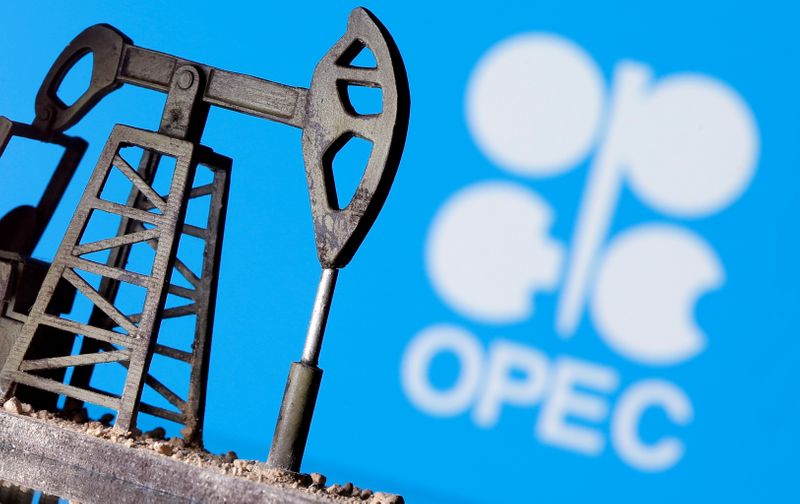By Alex Lawler
LONDON (Reuters) - OPEC oil output has risen by over 1 million barrels per day (bpd) in July as Saudi Arabia and other Gulf members ended their voluntary extra supply curbs on top of an OPEC-led deal, and other members made limited progress on compliance.
The 13-member Organization of the Petroleum Exporting Countries pumped 23.32 million bpd on average in June, the survey found, up 970,000 bpd from June's revised figure, which was the lowest since 1991.
OPEC and allies agreed in April to a record output cut as the coronavirus crisis hammered demand.
An easing of lockdowns and lower supply have helped oil (LCOc1) climb above $40 (30.45 pounds) from April's 21-year low of below $16 a barrel, although concerns of a second wave are keeping a lid on gains.
"Upside potential will continue to be in short supply so long as the COVID hangover lingers," said Stephen Brennock of oil broker PVM.
OPEC, Russia and other producers, a group known as OPEC+, agreed to cuts of 9.7 million bpd, or 10% of global output, from May 1. OPEC's share, to be made by 10 members from October 2018 levels in the case of most countries, is 6.084 million bpd.
In July, they delivered 5.743 million bpd of the pledged reduction, equal to 94% compliance, the survey found. Compliance in June was revised up to 111%.
THREE-DECADE LOW
July's increase is the biggest since April, when OPEC briefly pumped at will before the latest supply cut was agreed.
To further support the market, Saudi Arabia, Kuwait and the United Arab Emirates had pledged to cut by an extra 1.18 million bpd in June only.
This helped curb output last month to OPEC's lowest since 1991, excluding membership changes, based on Reuters surveys and OPEC figures.
The biggest rise in supply in July came from Saudi Arabia, which pumped 8.4 million bpd, up 850,000 bpd from June and close to its quota, the survey found.
The United Arab Emirates and Kuwait also boosted output close to their targets.
Iraq and Nigeria, which boosted compliance in June and were laggards in previous OPEC+ deals, did not make any further cuts in July, the survey found, with Iraq boosting exports. Both have pledged to make additional reductions in later months.
"The low prices are making life difficult for those OPEC countries that are required to cut their production additionally," said Eugen Weinberg, analyst at Commerzbank (DE:CBKG).
Iranian and Libyan supply held steady in July and Venezuelan output dropped further. All three are exempt from voluntary cuts because of U.S. sanctions or internal issues limiting output.
Libyan output has plunged since January due to a blockade of ports and fields by groups loyal to eastern-based commander Khalifa Haftar.
The Reuters survey aims to track supply to the market and is based on shipping data provided by external sources, Refinitiv Eikon flows data, information from tanker-trackers such as Petro-Logistics and Kpler, and information provided by sources at oil companies, OPEC and consultants.
